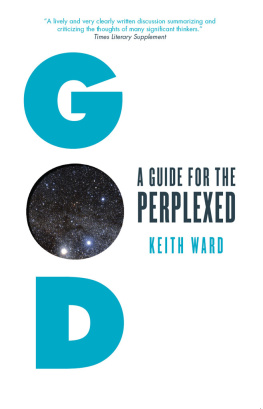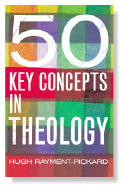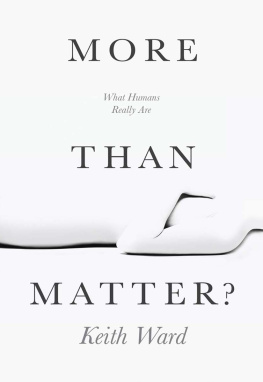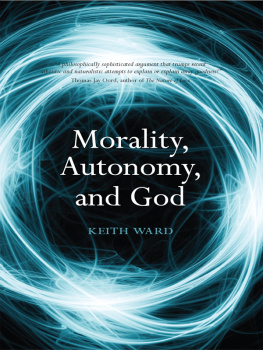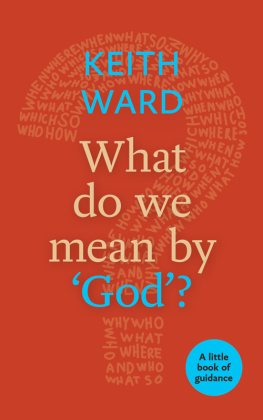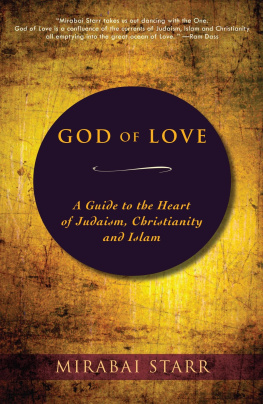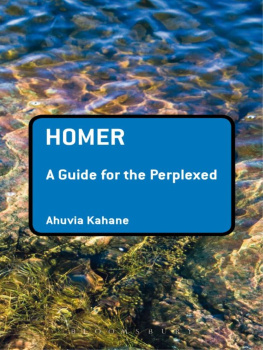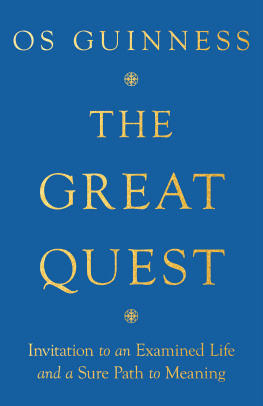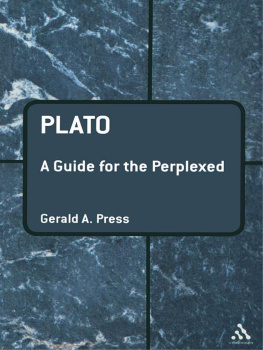God
A Guide for the Perplexed
ABOUT THE AUTHOR
Professor Keith Ward is a Fellow of the British Academy, and Professorial Research Fellow at Heythrop College, London. He was formerly Regius Professor of Divinity at the University of Oxford, and is one of Britains foremost writers on comparative theology and Christian issues. Notable works written by Keith Ward and published by Oneworld include Christianity: A Beginners Guide, God Chance & Necessity, and God, Faith, and the New Millennium.

The author would like to express his gratitude to Mel Thompson and Mary Starkey for their valuable and helpful suggestions regarding this book.
Keith Ward 2002
First published in hardback by Oneworld in 2002
This eBook edition published in 2013
All rights reserved
Copyright under the Berne Convention
A CIP record for this title is available from the British Library
ISBN 978-1-85168-973-6
ebook ISBN: 978-1-78074-122-2
Typeset by LaserScript, Mitcham, UK
Oneworld Publications
10 Bloomsbury Street
London
WC1B 3SR
Stay up to date with the latest books, special offers, and exclusive content from Oneworld with our monthly newsletter
Sign up on our website
www.oneworld-publications.com
1
A feeling for the gods
In which the reader will discover what happened in Book One of the Iliad, will discover many curious facts about Greek gods and goddesses, will remark a strange similarity between English Romantic poets and German theologians, will come to suspect that Descartes, though he doubted everything, did not quite doubt enough, will find Schleiermacher lying on the bosom of the infinite world, will discover what terrified Professor Otto, and why certain German professors talk to trees, will be forced to distinguish between symbolic and literal speech, and may develop a feeling for the gods.
God, literalism and poetry
Traditional images of God seem to have lost their appeal in modern American and European culture. It is not that Gods existence has been disproved philosophers continue to debate the proofs inconclusively, and no informed and honest observer of the philosophical scene really thinks a case has been established either way, or ever will be. No, God has simply become boring and irrelevant. We no longer care for big men with white beards. We no longer feel the weight of tremendous guilt that drove the Pilgrim onto his Progress. Jesus has sunk into the pages of irrecoverable history, and it seems impossible to draw him out again in a new resurrection which might make him a powerful image of infinity for more than a tiny handful of our contemporaries.
The sad thing and it is sad, for it is a loss of a kind of perception, the atrophy of a distinctively human way of seeing is that there seems to be nothing to replace such images, to show us how to be one with the infinite in the midst of the finite and to be eternal in a moment (Schleiermacher, Speeches on Religion, second speech, 1799).
Spirituality, the cultivation of exalted states of consciousness, may thrive in the borderlands of our culture, but religion, the organised official cult of worship of God, is dying. This is most obvious in Europe, where places of pilgrimage have become tourist attractions, churches have become architectural monuments, and religious rituals have become performances to be observed by anthropologists with camcorders. But in America too, while popular religion remains strong, there is a widespread intellectual revulsion against organised religion. There is a hostility to the seemingly naive biblical literalism of many Christian churches, which is met by an equal hostility on their part to many of the teachings of modern science. In the furious battles about creationism and fundamentalism, it often seems that we in our age have simply lost a sense of what religion is really about. We argue about theories and doctrines and facts which are very hard to establish, and in the process we reduce religion to a sort of argumentative and speculative science. We very often seem to lack a feeling for God or for the gods, the primal vision which lies at the roots of religion.
Why is this? I think it is partly because people have come to take the traditional images of God too literally. In an age where science is the queen of the academy, it is widely thought that the literal, the countable and weighable real, is the true, and the only form of truth. So God, if there is a God, must be the sort of being the sciences could describe God must be a super-person, making differences to the world which we can test and verify. God must be a cause whose effects we can discover by experiment and observation. Yet that God has turned out to be superfluous to requirements. God is, to put it bluntly, redundant. No special divine effects have ever been recorded in the laboratories of science, and science explains the world very well without God. So that God, the God who ought to be another fact that we can record and document, seems to have disappeared from the modern world.
This prompts the thought that maybe what has gone wrong is the idea of God as a sort of literal extra fact. But what else could God be? To discover that, we might need to return to the roots of religious belief in human experience, and try to see how talk of God, or of the gods, arises and what it is meant to express. Is there such a thing as a feeling for the gods, which the modern emphasis on factual knowledge has somehow suppressed? It may be illuminating to look at one of the earliest literary works in Western history, Homers Iliad. The subject of the epic is the Trojan war, but it is filled with references to the gods, who appear to its human characters, take part in their battles and ultimately dictate their fortunes. The Iliad could be read as a literal text, for which clearly fictional supernatural persons walk and talk with Greek and Trojan warriors. Indeed, the New Shorter Oxford English Dictionary suggests such an interpretation:
god a superhuman person regarded as having power over nature and human fortunes.
But the Iliad is, after all, poetry, and so we may suspect that Homer (let us follow tradition in allowing there to be such a poet who is the author) is doing something else with his stories of the gods, something that may still have the power of shedding light on human experience, and counteracting the sense of irrelevance that God and the gods now so often seem to have. The gods and goddesses might not have been thought of as real persons, who lived on top of Mount Olympus, who feasted and quarrelled and indulged in plots of many sorts. After all, Mount Olympus was not too difficult to climb, and it could quickly be discovered that Zeus had no palace on top of it. Perhaps if we explore the Iliad as poetry, we might gain a better sense of the feelings that Homer was seeking to express in writing as he did of the gods.
A world full of gods
Sing, goddess, of the anger of Achilles... So begins the Iliad. Here is a god, or at least a goddess, already, in the first line. The poet is not telling someone else to write the poem for him. Or is he? The goddess will sing through him. He will write the words, but they will come from a source from beyond his conscious mind, from an inspiring power, creative, expressive, truly supernatural since it is beyond the natural powers of most humans (who are not all poets, thank goodness).
Homer conjures up the goddess or her power to infuse his mind, filling it with imaginative power and beauty. That is not just some archaic, primitive fantasy. It is a wholly contemporary fantasy, too. When we sit down to write that great novel which, we are told, lies within each of us, we wait for the Muse to inspire us. Unfortunately, the Muse usually seems to be on vacation, and the great book does not get written.

